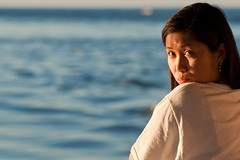 With summer coming to a close (well, for us in the tropics at least), you can still make good use of the last few days to shoot a few portraits at the beach. When the sun sets, its coveted golden light can not only add drama to your shot, but give skin a warm glow as well.
With summer coming to a close (well, for us in the tropics at least), you can still make good use of the last few days to shoot a few portraits at the beach. When the sun sets, its coveted golden light can not only add drama to your shot, but give skin a warm glow as well. However, the golden light fairy will not grant you great shots just because you wished for them. You have to take the following factors in consideration before making the picture:
- Late afternoon light (at around 5 pm) comes streaming in from the side, so there’s a good chance that a portion of your subject’s face will fall into shadow.
- Or if you don’t meter your exposure correctly, you could end up with a silhouette. Not that getting a silhouette is bad, if that was the effect that you were trying to achieve.
__________
- To address the issue with part of the subject’s face falling into shadow (which in itself is a dramatic effect if that’s what you were striving for), position your subject near the water. Water doesn’t only make for a great background, but reflects a lot of that golden light up as well. You have Mama Nature giving you an instant reflector.
- However, placing your subject near the water can possibly cause your camera to ‘misinterpret’ the scene in terms of the amount of light present. Sunlight reflecting off the water can fool your camera’s sensor into thinking that the scene is too bright, which will make it underexpose the photo (resulting in an image that is too dark). To get around this, you’ll have to accept the fact that your camera isn’t that smart and that it won’t do the heavy lifting for you; so, you switch your camera to spot metering or partial metering, point the AF point or box over your subject’s face, press the shutter button halfway, recompose your shot and press the shutter button all the way.
 If you take the above tips into consideration, you’ll end up with gorgeous beach portraits to remind you of your summer adventures.
If you take the above tips into consideration, you’ll end up with gorgeous beach portraits to remind you of your summer adventures. I hope these tips help you make better pictures.
0 comments: Drop your 2¢ in the comment well.:
Post a Comment